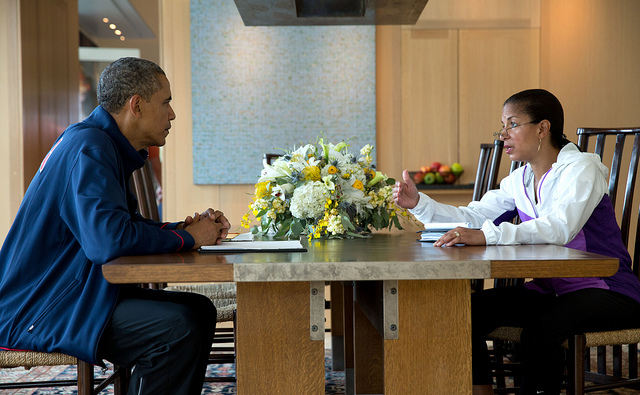Called a ‘War Speech’ by the Washington Post’s Max Fisher, Secretary of State John Kerry dispelled all doubt at his Monday evening press conference over the Obama administration’s consideration of military action against Syria’s Bashar Al-Assad regime. Almost a year to the day since President Obama made his ‘red line’ comment regarding the use of chemical weapons in Syria, its most recent (and visible) use on the outskirts of the Syrian Capital of Damascus has forced the President and his administration into the awkward position of preparing for another Middle Eastern conflict at a time they’d promised to be thinking about the Asia-Pacific.
Despite the words of key administration officials and even its unveiling as the Administration’s foreign policy blueprint by President Obama before the Australian Parliament in 2011, doubt over the US ‘Rebalance to Asia’ formed unsurprisingly quickly. At the core of these doubts, even prior to current issues related to sequestration, stood the tall order of US disengagement from combat operations in Afghanistan and Iraq. Due in part to the considerable investment of the Administration’s early energy into reducing the visible presence of the US in the Middle East, it seemed inevitable to some that the region would reemerge as the primary focus of the Administration as unaddressed issues would build critical mass and become too large to ignore.
This view seemed to pick up steam as major architects and proponents (such as Hillary Clinton and Kurt Campbell) of the ‘Rebalance to Asia’ in the administration began to depart from their respective positions and became all but certain with the nomination and appointment of then-Senator John Kerry to Secretary of State. Perhaps to best summarise the view of these observers is Randy Schriver, a Former Deputy Assistant Secretary of State for East Asian and Pacific Affairs for the G.W. Bush Administration who at a recent event hosted by the Atlantic Council in Washington, noted his inability to call to mind an official as the Obama Administration’s current ‘Asia point man.’
To a certain extent, most states in the Asia-Pacific seemed unfazed by the re-shifting in focus. Beyond a change in key personnel as well as doubts and confusion related to the strategic coherency of the ‘Rebalance to Asia’, the general difficulty of the Obama Administration (such as sequestration) from the start of its second term made efforts to preserve political capital understandable. However, what’s potentially unacceptable is the possibility that the US will be unable to act both decisively and clearly during its upcoming recommitment to the Middle East despite having again freed up its focus in the Asia-Pacific to do so.
As such, the question related to Syria for many observers in and around major US partners and allies throughout the Asia-Pacific is not related to the actual use of chemical weapons, rather the potential US response to their use. Faced with the prospect of being damned by ‘owning’ the conflict if the response is too ‘heavy handed’ or faced with being damned through questions over its ‘reliability’ if the response is too ‘light’, states in the Asia-Pacific are no doubt watching closely as to how the Obama administration will act—no doubt, a source of unwanted additional pressure.
Overall, whatever the response, strategic thinking in the Asia-Pacific will undoubtedly be affected as factors (like the credibility of US security assurances) are reassessed. A particularly depressing thought lies in the potential repercussions of the ‘what if’ scenario where the Obama administration bungles both management and messaging of the crisis. Side effects could range from a frustrated legislative agenda due to reluctant participation of allies and partners in ongoing efforts such as Trans-Pacific Partnership negotiations and even a more confident and aggressive North Korea. The question really boils down to a simple metaphor; would you dance again with a partner who couldn’t get his left and right foot right?
Andrew Kwon is a Joseph S. Nye Jr. research intern at the Center for a New American Security in Washington DC, USA. The views expressed are his own. Image courtesy of Flickr user The White House.


